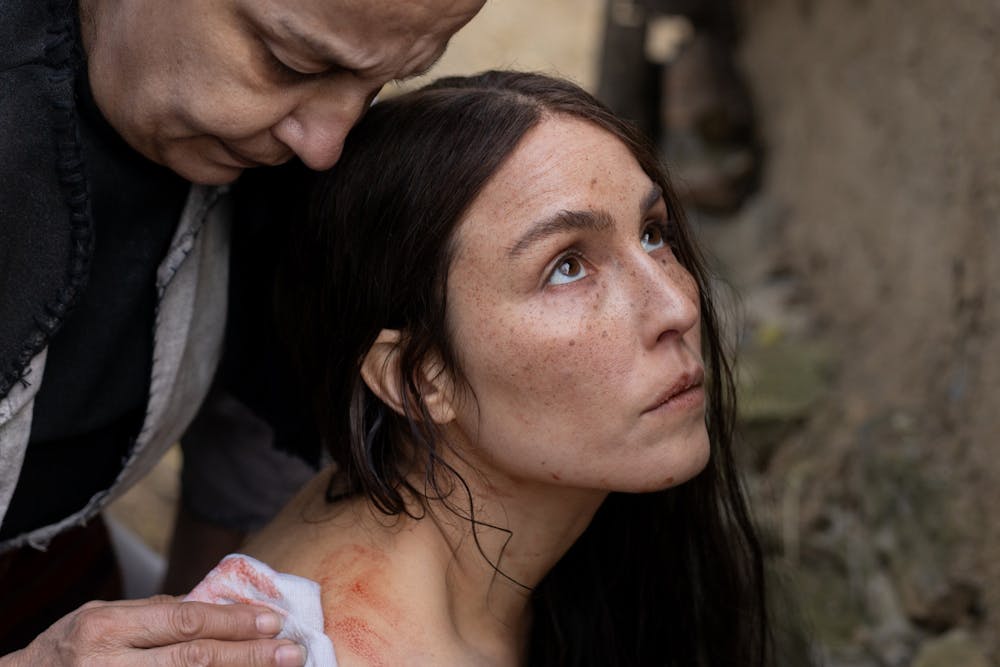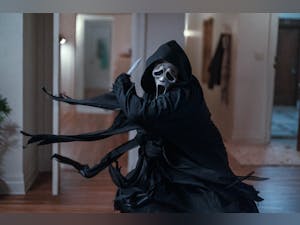From: Silver Screen
REVIEW: ‘You Won’t Be Alone’ grapples with what it means to be human

Fans of folk horror and those who enjoyed “The Witch,” “Midsommar” and “Lamb” will likely savor “You Won’t Be Alone,” filmmaker Goran Stolevski’s directorial debut. What sets Stolveski’s film apart from its predecessors, however, is its self-awareness and depiction of humanity.
“You Won’t Be Alone” follows the tale of Maria (Anamaria Marinca), a witch who haunts the hills of 19th century Macedonia. Villagers are aware of her evil, and the audience, too, is privy to a few murmurings about the “wolf-eateress.” However, for the majority of the film, there is not much dialogue. Besides small glimpses of folklore being passed between villagers, the film is primarily told through the narration of Nevena (Sara Klimoska) who became a witch after being cursed by Maria as a child.
Contemporary horror tends to take a nuanced approach to characters’ morality, giving interesting looks at what constitutes a monster. These themes are presented with more complexity than ever in Stolevski’s new film. From the onset, empathy is established between the audience and the witch, Nevena, who also serves as the film’s narrator. For most of her childhood, she is trapped within a menacing yet beautiful cave where she evades any kind of human socialization. From the first moments of the film, the audience feels for the young witch who is deprived of a normal human life. The witch, typically an emblem of darkness, is portrayed quite innocently here as she has a naivete about the world.
When Maria brings Nevena into the outside world at the age of 15, the girl barely knows how to walk, let alone take care of herself or interact with humans. Thus, a Frankenstein-esque story commences where we watch and listen to Nevena’s narration as she moves through the world. Like Frankenstein, she has to figure out how to be human by observing others, and as a result, the complex, illogical world we live in is starkly portrayed.
Unlike Frankenstein, people show Nevena kindness, and she gradually learns human emotion. At first, one might attribute this affection to her ability to shapeshift and look like others from the community. If she appeared in her natural, physically disfigured form, it would be unlikely that people would extend their help to her. However, the film suggests at its end that the villagers enfold her into the community as their own.
Nevena takes on the identity of three different individuals throughout the course of the film. At first, she is a battered wife. In this role, she learns the position of women in society. Her mother-in-law shows her compassion and tenderness as she teaches her to dress, clean and cook. Along with these menial tasks, she experiences female companionship and learns emotional cues.
She then morphs into an attractive man in the village. This proves to be quite a contrasting experience as Nevena learns about masculinity, sensuality and confidence. Later when she shape-shifts into a child, she combines both her lessons of femininity and masculinity. She describes her interactions with men as water-like; she has to conform to their actions. Women, however, closely resemble glass: she must reflect their actions back to them.
Taking the form of a child, Nevena receives the uninhibited joy that she was deprived of growing up in a cave. She remarks on how she didn’t know life could produce so much happiness. These scenes underscore the positive effects of love and compassion.
“You Won’t Be Alone” is a primal, touching film that inoculates the audience into Nevena’s transformation, reminding the viewer of the first time they felt all these emotions. Early in the movie, she leaves her cave and looks around at the landscape outside rendered through a series of stunning shots of the Macedonian hills, and it feels like we too are seeing natural beauty and light for the first time. Nevena cries in a powerful burst of raw emotion that is likely to bring tears to the viewer’s eyes as well.
“You Won’t Be Alone” sets a new standard for horror, proving that the genre might be the best outlet for critical, unadulterated looks into the human experience.
“You Won’t Be Alone” was released in theaters on April 1.




